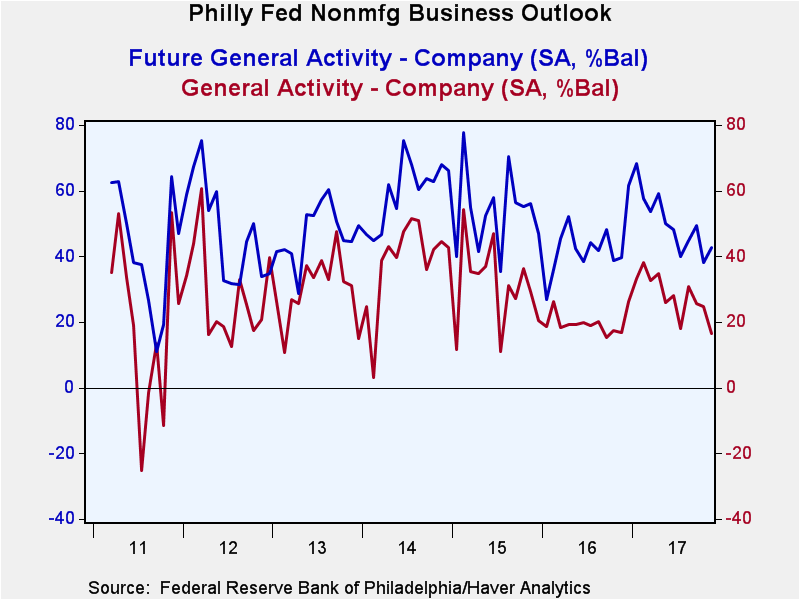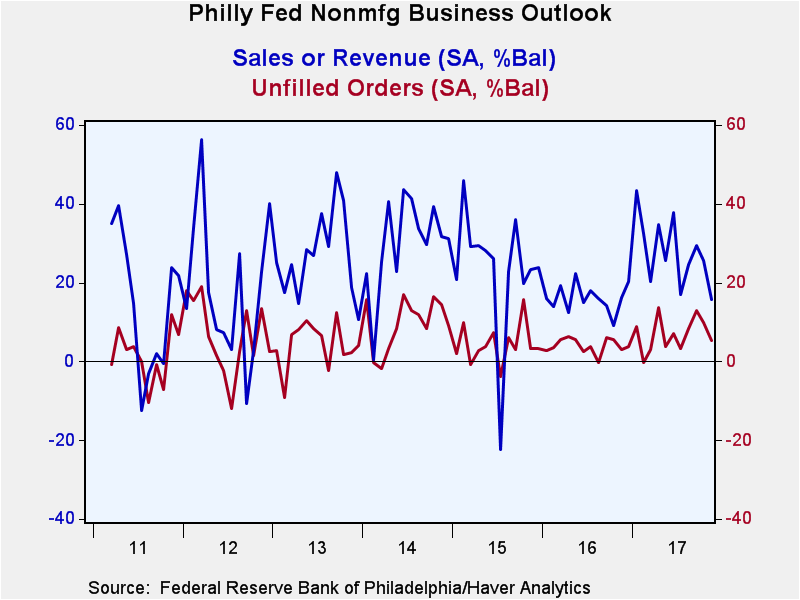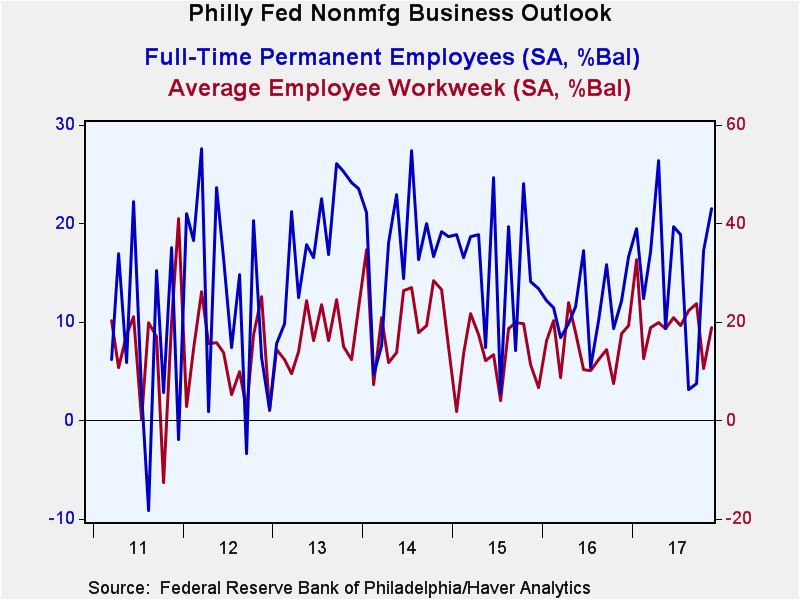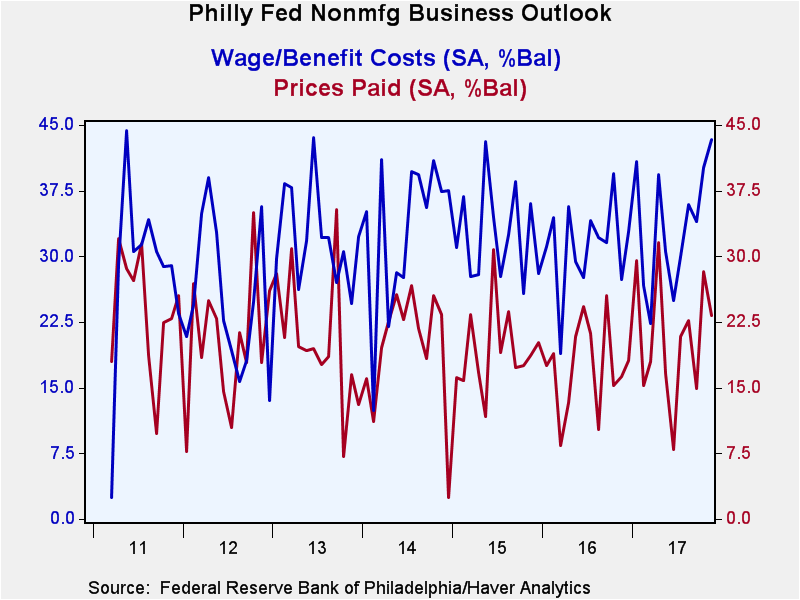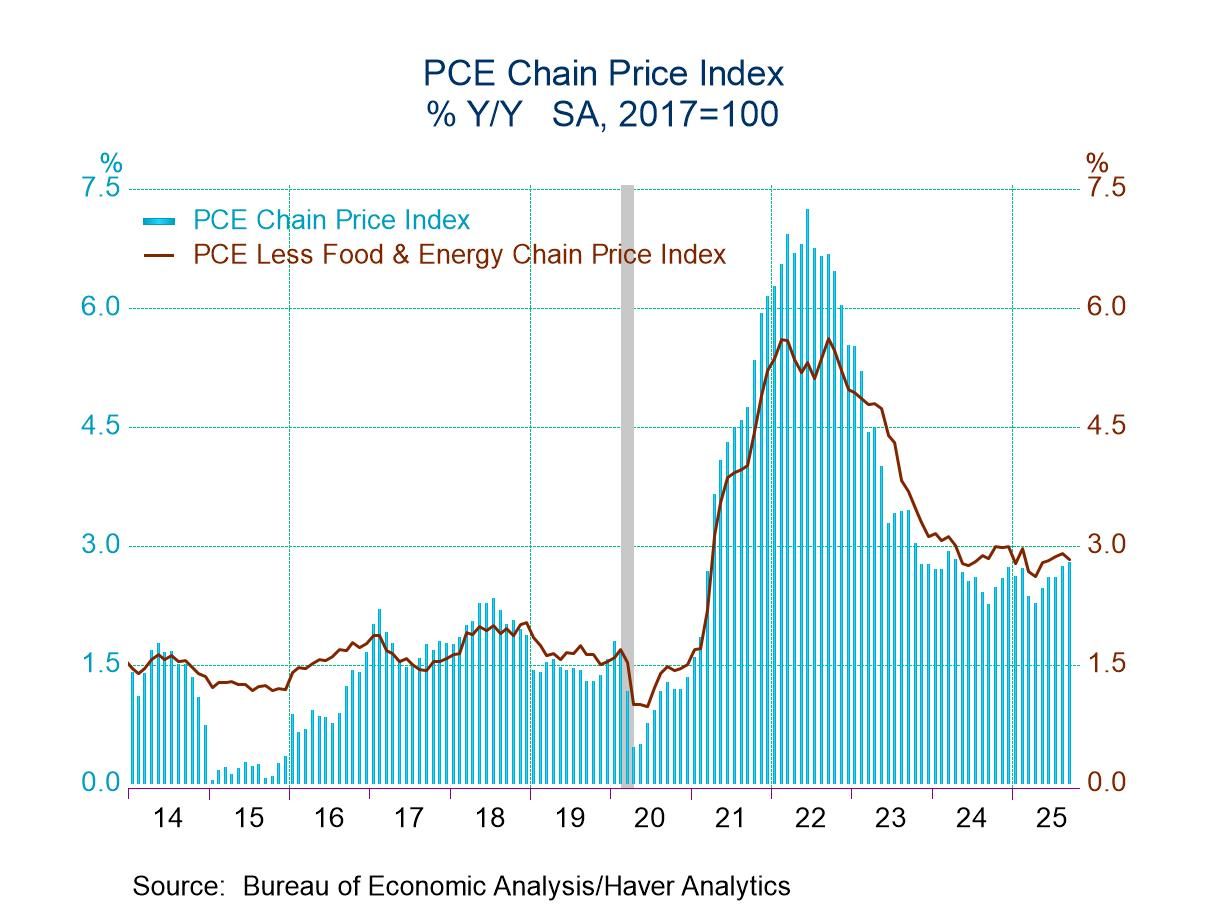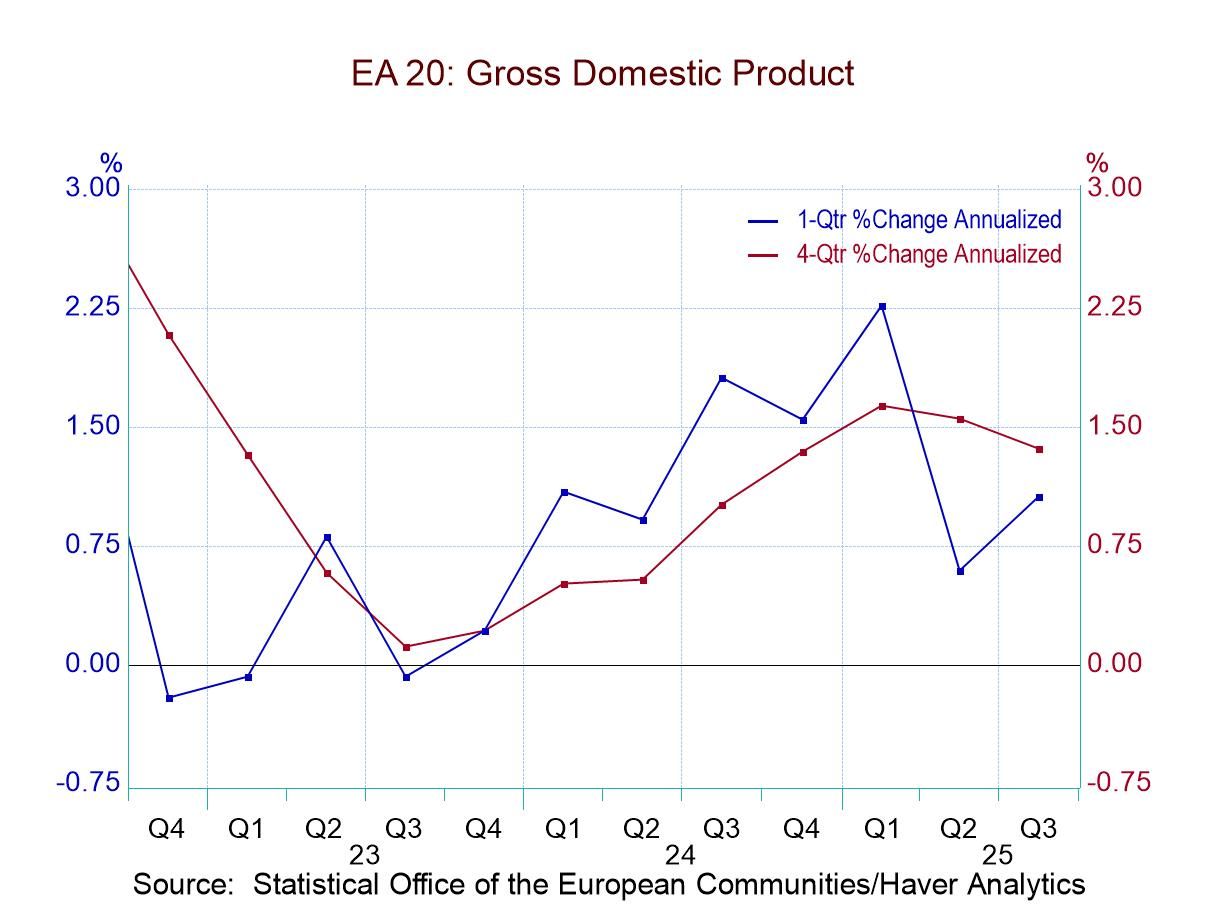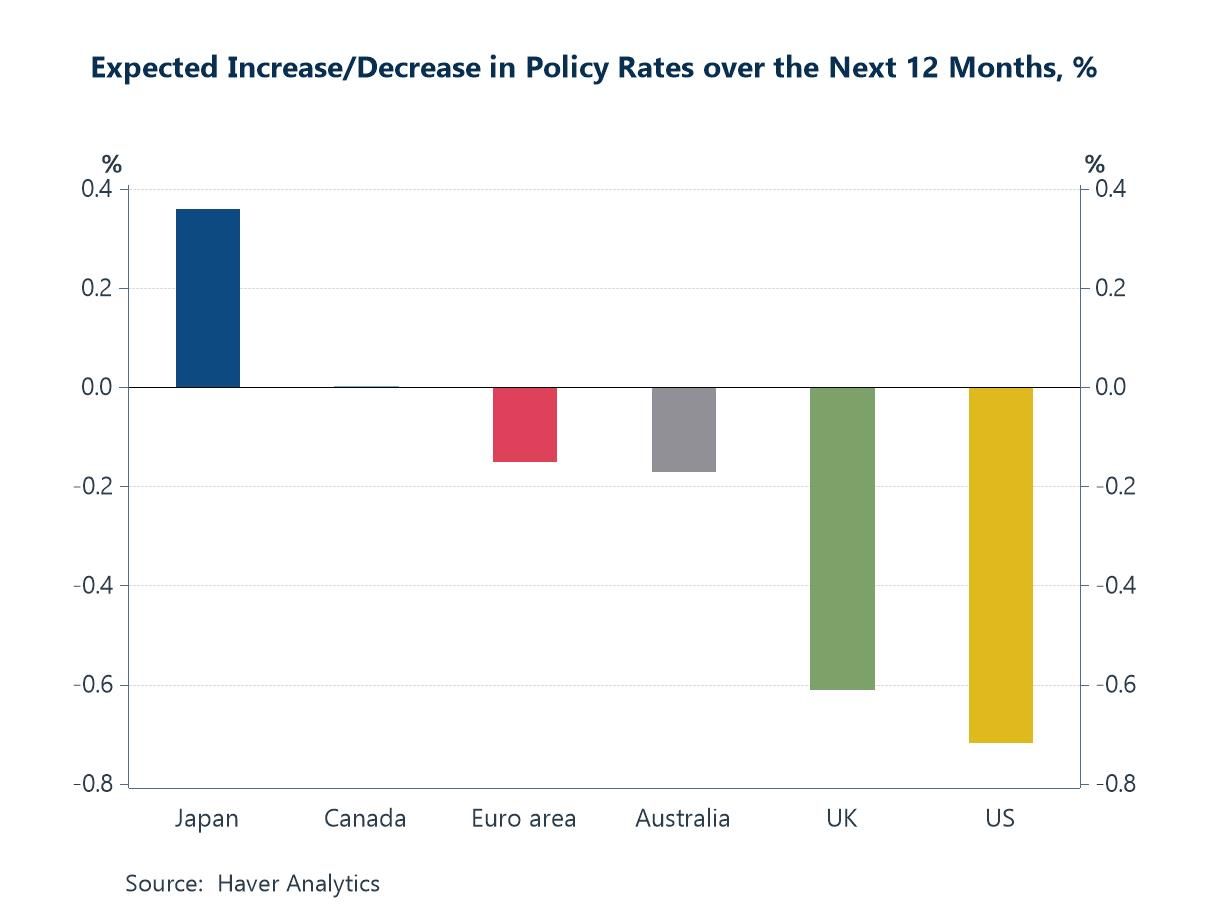 Global| Nov 21 2017
Global| Nov 21 2017Philadelphia Fed Nonmanufacturing Business Conditions Slip Again
by:Tom Moeller
|in:Economy in Brief
Summary
The Federal Reserve Bank of Philadelphia's Nonmanufacturing Business Index of current conditions at the company level declined to 16.4 in November from 24.7 during October. It was the third straight monthly decline and left the index [...]
The Federal Reserve Bank of Philadelphia's Nonmanufacturing Business Index of current conditions at the company level declined to 16.4 in November from 24.7 during October. It was the third straight monthly decline and left the index down versus the February high of 38.0. Thirty-nine percent of respondents reported an increase in current activity while 22% reported a decline. The expectations index at the company level for November improved to 42.8, but remained down from 68.3 in January.
Sales or revenue fell to the lowest level since October of last year. Unfilled orders similarly declined, but new orders improved modestly. The number of full-time permanent employees surged to the strongest level since April. The index of part-time/temporary employment eased m/m and was fairly steady y/y. The average workweek reading improved slightly. Capital expenditures on facilities slipped, while spending on equipment and software reversed its October rise.
The index of prices paid fell slightly m/m but remained up sharply y/y. Twenty-five percent of respondents paid higher prices while two percent paid less. The prices received index declined sharply m/m and y/y, while the wages and benefits index strengthened.
The Philadelphia Fed figures are diffusion indexes which are calculated by subtracting the percent of respondents reporting poorer business conditions from those reporting improvement. So, readings above zero indicate more positive than negative responses. These indexes have a good correlation with growth in the series covered. The data are available in Haver's SURVEYS database.
| Federal Reserve Bank of Philadelphia: Nonmanufacturing Business Outlook Survey (Diffusion Index, SA) | Nov | Oct | Sept | Nov'16 | 2016 | 2015 | 2014 |
|---|---|---|---|---|---|---|---|
| General Activity - Company | 16.4 | 24.7 | 25.7 | 16.8 | 19.7 | 31.3 | 38.7 |
| New Orders | 16.5 | 11.4 | 26.7 | 13.6 | 15.6 | 21.7 | 27.9 |
| Sales or Revenue | 15.8 | 25.5 | 29.3 | 16.3 | 16.1 | 23.6 | 30.2 |
| Inventories | 3.9 | 0.6 | -3.4 | 6.2 | 4.4 | 5.2 | 5.8 |
| Number of Full-Time Permanent Employees | 21.5 | 17.3 | 3.8 | 12.2 | 11.7 | 15.5 | 17.3 |
| Prices Paid | 23.2 | 28.3 | 14.9 | 16.3 | 17.5 | 19.2 | 19.7 |
| Wage & Benefit Costs | 43.4 | 40.1 | 34.0 | 27.3 | 31.2 | 32.5 | 33.1 |
| Expected General Activity - Company | 42.8 | 38.0 | 49.3 | 39.5 | 42.9 | 53.8 | 59.9 |
Tom Moeller
AuthorMore in Author Profile »Prior to joining Haver Analytics in 2000, Mr. Moeller worked as the Economist at Chancellor Capital Management from 1985 to 1999. There, he developed comprehensive economic forecasts and interpreted economic data for equity and fixed income portfolio managers. Also at Chancellor, Mr. Moeller worked as an equity analyst and was responsible for researching and rating companies in the economically sensitive automobile and housing industries for investment in Chancellor’s equity portfolio. Prior to joining Chancellor, Mr. Moeller was an Economist at Citibank from 1979 to 1984. He also analyzed pricing behavior in the metals industry for the Council on Wage and Price Stability in Washington, D.C. In 1999, Mr. Moeller received the award for most accurate forecast from the Forecasters' Club of New York. From 1990 to 1992 he was President of the New York Association for Business Economists. Mr. Moeller earned an M.B.A. in Finance from Fordham University, where he graduated in 1987. He holds a Bachelor of Arts in Economics from George Washington University.


